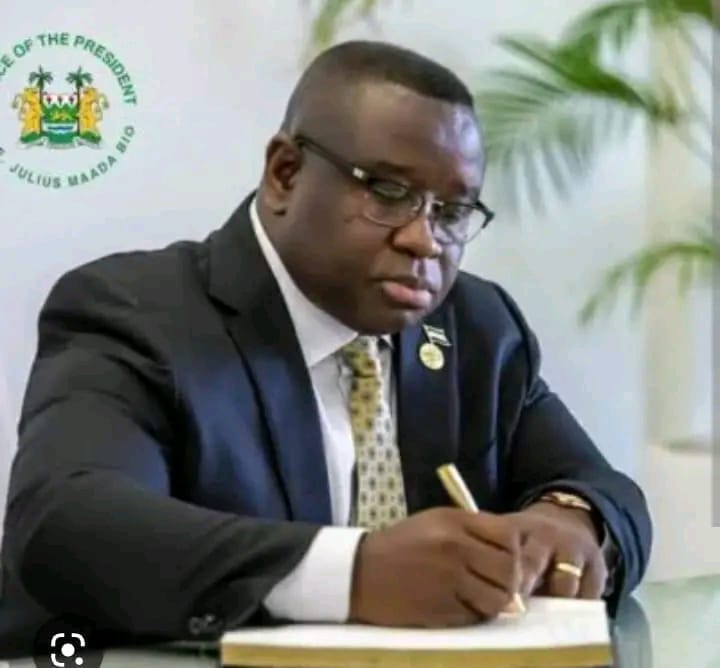The government of President Julius Maada Bio appears to be determined to take the Silk Road to the People’s Republic of China to spite Western Democracies, particularly Britain and the United States of America (USA), simply because it doesn’t want to practise transparency and accountability on the one hand, and sticking to basic democratic principles on the other.
The Bio-led administration seems to be leaning towards China because Britain, the USA, and most countries in the European Union (EU) have all raised concerns over the opaque manner in which the Electoral Commission for Sierra Leone (ECSL), led by an alleged known member and operative of the ruling Sierra Leone People’s Party (SLPP), handed over the June 24 general elections to President Bio and his SLPP.
Another school of thought has posited, or is positing, that another reason why the Bio-led administration is cozying up to China is because the current Sierra Leonean government seems not to believe in financial transparency and accountability. The West, through its Bretton Woods institutions: the World Bank and the International Monetary Fund, lays more premium on asking Sierra Leone and other mendicant countries how the loans and grants given are utilized.
But in the case of China, loans and grants are given without asking any questions about transparency and accountability as long as China’s mining and construction interests are protected and not disturbed. This fits very well with the seemingly opaque manner in which the Bio-led administration is running the economy.
It could be recalled that after the June 24 general elections, China and Russia were the two major countries that did not condemn the murky manner in which Konneh and his gang at the ECSL handed down a second term to President Bio. Because China doesn’t believe in democracy; that’s why it is not interested in asking the Bio-led administration to stick to democratic tenets and contractual agreements.
Despite President Bio and his government appear to be taking the Silk Road to China, believing that Sierra Leone will benefit immensely from such coziness, a February 2021 survey by the Institute for Governance Reform (IGR) argues that, “China’s presence in Sierra Leone is rooted in its desire to secure vital resources and raw materials to feed its enormous domestic population. Despite China’s insistence that it promotes win-win trade relations with bilateral partners, local communities complain that they are at the losing end and poverty levels are rising”. That IGR’s survey also reveals evidence of how “overpriced road infrastructure contracts going to Chinese companies are contributing to the country’s growing debt burden; and how China’s dominance in the fishing sector undermines local revenue generation and exacerbates economic hardship in local fishing communities”. So, in other words, Chinese investments in Sierra Leone are not bordering on win-win situations but on exploitation.
Most of the Chinese investments in Sierra Leone are not based on mutually beneficial and accountable relationship with the people of Sierra Leone generally. Take the Black Johnson project as an example. In May 2021, more than 100 hectares of pristine forest and beach at Black Johnson, a village in the peninsular, was being sold for about US$55 million to a Chinese state-owned enterprise for the construction of a fishing harbour. Despite its would-be human and ecological disaster, and the outrage it brought in its trail, the Bio-led administration has green-lighted the Chinese to continue with a project that will lead to the loss of lands and livelihoods.
Apart from the Black Johnson project, there are other signs that the Bio-led administration appears to have mortgaged Sierra Leone to China. The tollgates at Hastings, Songo, and Masiaka; the rail and port at Pepel; most of the trawlers on Sierra Leonean waters are Chinese-owned, and most government construction contracts are being awarded to the Chinese.
According to one of the findings of the IGR’s February 2021 survey, “…Since independence in 1961, no foreign country has ever infiltrated Sierra Leone to the degree that China has done in the post-war era (2002 to present). This is true not only in terms of the breath of investment activities, but also in terms of the extent to which Chinese nationals and corporations have penetrated deep into the fabric of the country. Sierra Leone’s largest construction companies namely; Beijing Urban Construction Group (BUGC), Gouji, and China Seventh Railway Group (CSRG) are Chinese owned. In the fishing sector, about 50% of the 139 registered vessels are Chinese owned and operated….”
Sierra Leone is fast becoming a little China in Africa. The Nationalist newspaper learnt that one of the cardinal reasons why the Bio-led administration may have decided to take the Silk Road is because it has allegedly been promised, by the Chinese government, that if given enough pieces of the Sierra Leonean cake; the near mythical Lungi Bridge would be constructed with funds from the Chinese government. This promise might have been one of the main reasons why the current government appears to be debating the idea of breaching existing contracts and thinking of awarding those breached contract to Chinese-owned companies.
So, we in the Nationalist are of the view that it should not come as a surprise to ordinary Sierra Leoneans if, in the coming weeks, they are informed that President Bio would be going to China to meet with the Chinese President, Xi Jinping, to officially seal the mortgage of Sierra Leone to China. After all, the Bio-led administration has carved the niche of ramming down unpleasantries the throats of Sierra Leoneans “paopa-ly”.


